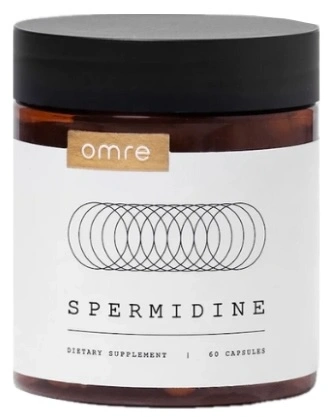Table of Contents
Imagine if your body had a built-in recycling system to keep cells fresh and functioning smoothly. It sounds futuristic, right?
But this process already exists—it’s called autophagy, and spermidine plays a starring role.
Found naturally in your body and in everyday foods, spermidine has been making waves for its potential to support cellular renewal, slow down aging, and even ward off certain diseases.
In this article, we’ll break down what spermidine does, how it works in your body, and the exciting possibilities it might hold for your health. While much of the research is still in its early stages, the findings so far are nothing short of fascinating.
Spermidine
Cellular autophagy activator, providing a potent and highly purified dose of Spermidine.*
What Is Spermidine?
 Spermidine is a naturally occurring compound found in all living cells that supports autophagy, a process that helps cells clean out damaged components and renew themselves. It’s often referred to as a potential “fountain of youth” due to its association with anti-aging benefits and cellular health.
Spermidine is a naturally occurring compound found in all living cells that supports autophagy, a process that helps cells clean out damaged components and renew themselves. It’s often referred to as a potential “fountain of youth” due to its association with anti-aging benefits and cellular health.
Chemically classified as a polyamine, spermidine is found throughout the body and in many foods. It’s crucial for cellular growth, repair, and function.
What sets spermidine apart is its potential ability to activate autophagy, a process where cells recycle old, damaged parts to stay healthy. Think of it as spring cleaning at the microscopic level.
The connection between spermidine and longevity has been backed by findings in animal studies.
For example, a study in mice showed that those given spermidine-enriched diets had improved cardiovascular health and reduced age-related decline, living about 10% longer than their counterparts (1).
Similarly, human studies, like the 2018 Bruneck Study, linked higher dietary intake of spermidine to lower overall mortality rates over 20 years (2).Beyond its production in the body, spermidine can be found in foods like wheat germ, soy, mushrooms, and aged cheeses. Interestingly, gut bacteria also play a role in producing spermidine, making a balanced microbiome another key factor in maintaining its levels (3).
How Does Spermidine Work in the Body?
Spermidine works by activating autophagy, a natural process that helps cells renew themselves, adapt to stress, and maintain overall health. It also plays a role in DNA stability, protein synthesis, and reducing inflammation.
Autophagy is the backbone of spermidine’s benefits. When cells are stressed or damaged, autophagy steps in to recycle components, ensuring cells function efficiently.
Spermidine inhibits EP300, a protein that can suppress autophagy, effectively kick-starting this renewal process. This has been shown to protect cells from the effects of aging and stress.
Research highlights spermidine’s impact beyond autophagy. For instance, it’s been linked to stabilizing DNA, reducing oxidative stress, and even enhancing immune responses (4).
Studies in animals have demonstrated its ability to improve heart function, reduce inflammation, and delay age-related diseases (5).
One intriguing area is its relationship with the gut microbiome. Certain bacteria in the gut produce spermidine precursors, which the body converts to active polyamines. This symbiotic relationship suggests that maintaining gut health may amplify spermidine’s benefits.
Potential Health Benefits of Spermidine
While many studies on spermidine are conducted on animals or in lab settings, early findings suggest promising health benefits. However, more research is needed to fully understand its effects on humans.
Potential Benefits:
May Promote Longevity: Animal studies suggest spermidine-enriched diets might extend lifespan by improving cellular health (6).
Could Support Heart Health: Research in mice has shown improvements in cardiovascular function and reduced risk of heart disease (7).
Might Reduce Inflammation: Animal studies indicate that spermidine may help lower chronic inflammation, a key contributor to aging and diseases (8).
Potential Neuroprotective Effects: Early research hints at its potential in delaying cognitive decline and protecting against neurodegenerative diseases (9). With that said, there are conflicting studies on this topic.
Gut Health Connection: Foods or probiotics that enhance spermidine production might improve gut health and overall wellness (10).
- May Support Hair Growth: Some studies suggest spermidine could stimulate hair growth by activating stem cells and supporting follicle health (11).
Spermidine and Gut Health—A Symbiotic Relationship
Your gut might just be the hidden powerhouse behind spermidine production. Certain gut bacteria produce polyamines, including spermidine, which can be absorbed into the body and put to work in cellular repair and renewal.
This means a healthy gut doesn’t just help with digestion—it may also play a role in longevity and overall well-being.
Studies suggest that gut bacteria can convert precursors like putrescine into spermidine, amplifying its availability in the body.
One study even found that probiotic bacteria capable of producing polyamines improved endothelial function—a marker of cardiovascular health—and reduced inflammation.
In animal models, polyamine-producing probiotics helped lower age-related inflammation and extended lifespan.
So, keeping your gut happy might do more than soothe your stomach. It could give your cells the extra support they need to stay strong and healthy as you age.
Spermidine
Cellular autophagy activator, providing a potent and highly purified dose of Spermidine.*
How to Increase Spermidine Intake Naturally
-v1739154311361.webp) If you’re looking to increase your spermidine levels, you’ve got a few options. It starts with adding the right foods to your plate, maintaining gut health, and, for some, considering high-quality supplements. Here’s a breakdown to help you get started.
If you’re looking to increase your spermidine levels, you’ve got a few options. It starts with adding the right foods to your plate, maintaining gut health, and, for some, considering high-quality supplements. Here’s a breakdown to help you get started.
Spermidine-Rich Foods
Adding spermidine-rich foods to your diet is a simple and natural way to support cellular health.Top spermidine-rich foods (12):
Wheat Germ – One of the richest sources of spermidine.
Soy Products – Foods like natto and tofu are great plant-based options.
Mushrooms – Varieties like shiitake pack a spermidine punch.
Aged Cheeses – Parmesan and cheddar are tasty choices.
Legumes and Lentils – Easy to add to soups, salads, and sides.
Broccoli and Cauliflower – Nutritious veggies with added polyamine benefits.
Whole Grains – Found in breads, cereals, and pasta.
Lifestyle Tips
Beyond food, a few lifestyle habits can also help your body produce and use spermidine effectively.
Healthy habits to support spermidine levels:
- Eat fiber-rich foods to support gut bacteria that produce spermidine.
- Incorporate probiotics like yogurt and fermented foods to nourish gut health.
- Practice intermittent fasting, which may naturally boost autophagy.
- Stay physically active to promote cellular renewal and balance metabolism.
Supplements
For those who struggle to obtain enough spermidine through diet, supplements provide a convenient alternative. These products are designed to deliver consistent doses and are often paired with other nutrients to enhance absorption.
Supplements generally come in two main forms: natural and synthetic. Natural spermidine is typically sourced from ingredients like wheat germ or rice germ, while synthetic spermidine, often called spermidine trihydrochloride, is lab-made.
Experts generally recommend natural forms as they are structurally closest to how the body absorbs spermidine from food. However, synthetic forms may be a better option for individuals with gluten intolerance or celiac disease who need to avoid wheat-based sources.
When choosing the best spermidine supplement, it’s important to focus on quality and transparency. Look for products that use natural sources like wheat germ extract instead of synthetic ingredients.
Prioritize options that are third-party tested for purity and manufactured in FDA-registered facilities to meet safety standards. Research suggests that doses between 1–10 mg per day may be effective, so always check labels for accurate information.
One product that checks all these boxes is Omre Spermidine.
Made with high-strength wheat germ extract, it delivers 10 mg of spermidine per serving in a natural, ultra-absorbable formula. Produced in GMP-certified and FDA-registered facilities,
Omre Spermidine combines purity with potency, offering a reliable option for those looking to support cellular health and longevity.
Are There Any Risks or Side Effects?
Studies involving mice have shown that spermidine is generally safe and does not cause noticeable side effects at normal dietary levels (13).
While spermidine is considered safe when consumed through foods or supplements, higher doses might cause mild side effects in some people. It’s always a good idea to start with smaller amounts and check with your doctor if you have any health concerns.
Possible side effects at high doses:
Digestive issues like bloating or gas.
Allergic reactions in rare cases, especially for those sensitive to wheat-based products.
Nausea or mild stomach discomfort.
It’s important to note that many spermidine supplements are derived from wheat germ, which contains trace amounts of gluten.
While this is generally not an issue for individuals with gluten intolerance, those with celiac disease should avoid wheat-based supplements and consider gluten-free, synthetic alternatives instead.
Since most studies so far have focused on animals, ongoing research will help clarify how spermidine impacts long-term human health. For now, it remains a promising option, especially when taken in moderation.
Conclusion
Spermidine is a fascinating compound that plays a vital role in cellular health through its ability to stimulate autophagy, the body’s natural renewal process.
Research suggests it may support longevity, heart health, and brain function, while also potentially reducing inflammation and promoting skin and hair health.
Though many studies have been conducted on animals, early human research shows promising results, especially when spermidine is consumed through a balanced diet or high-quality supplements.
If you're looking to support your cellular health and promote longevity, Omre Spermidine offers a trusted and high-quality option.  Check availability today to explore its potential benefits for your health.
Check availability today to explore its potential benefits for your health.
FAQs
Does spermidine actually work?
Early studies suggest that spermidine may promote cellular renewal and support healthy aging by stimulating autophagy. While research in animals is promising, more human studies are needed to fully understand its long-term effects.
Can spermidine reverse aging?
Spermidine might help slow down some age-related processes by promoting cellular repair and reducing inflammation. It doesn’t reverse aging but may support healthy aging and longevity based on current research.
Does spermidine regrow hair?
Studies indicate that spermidine may stimulate hair growth by supporting stem cell activity and follicle health. While this is promising, more research is needed to confirm its effects on human hair growth.
What is the richest source of spermidine?
The highest dietary sources of spermidine include wheat germ, soybeans, legumes, and cereals. Foods like mushrooms, aged cheeses, and broccoli also contain notable amounts. Incorporating these into your diet can naturally boost spermidine intake.





